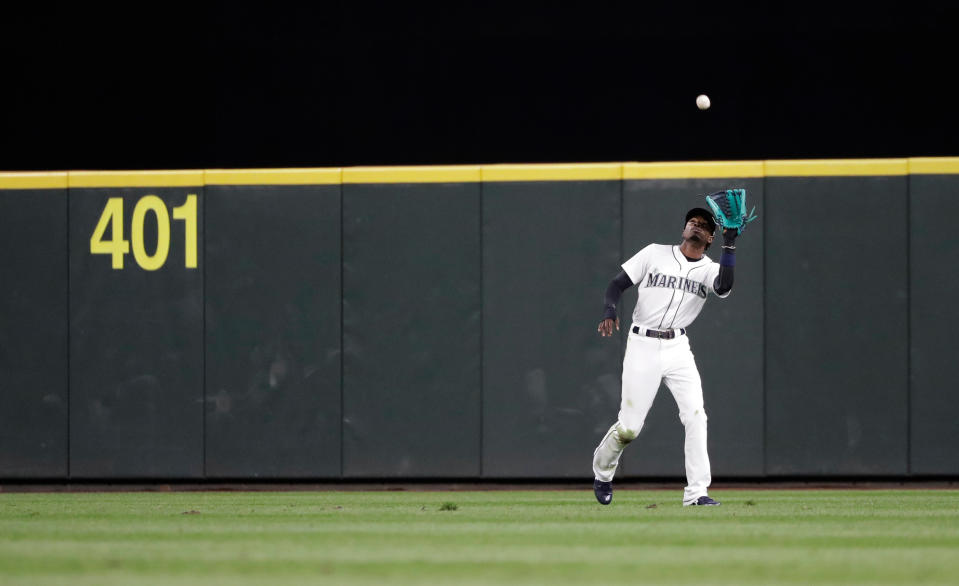Dee Gordon is ready to stop talking about his position change
SEATTLE — By the time the echo of the crack of the bat reached the upper levels of Safeco Field, Dee Gordon was already on the move. There was no way he was going to catch the screaming line drive off George Springer’s bat, and only a slim chance he was going to prevent the ball from bouncing to the outfield wall.
[Still not too late to join a Yahoo Fantasy Baseball league]
But Gordon didn’t have time to think. He just reacted. He pivoted, dug his spikes into the outfield grass and exploded into a full-speed sprint to his right.
Speed alone wasn’t going to get the job done on this play, even for Gordon. As the ball bounced off the grass and threatened to skip past everyone, Gordon slid, played it off the hop perfectly and immediately fired it back to the cutoff man. Springer, who was all but assured of a double after making contact, found himself stuck on first base.
It was the type of play you might expect from a veteran centerfielder. One who’s been groomed to play the position since Little League. It was not something you would expect from a guy who was a second baseman until two-and-a-half months ago.
Gordon’s transition to the outfield has been the only thing he’s discussed since the Seattle Mariners announced they would make the former Gold Glover move to center. After answering the same questions ad nauseam since the beginning of December, Gordon’s starting to lose his enthusiasm for the topic.
“I’m kind of tired of talking about it,” Gordon told Yahoo Sports. “I’ve been talking about it for two-and-a-half months.”
Gordon’s sliding stop in the first inning of Wednesday’s game is exactly why those questions aren’t going to cease any time soon. Keeping Springer at first paid off immediately. On the next pitch, José Altuve grounded into a double play. Carlos Correa struck out shorty after, ending the inning. A potential threat was erased with ease, and it was all due to Gordon’s ability in the outfield.
Plays like that also highlight why the Mariners thought this experiment would work. Gordon is fast enough to play anywhere, so it just came down to his ability to learn the nuances of playing the outfield.
Following the trade, Gordon spoke to Mariners general manager Jerry Dipoto, first base coach Chris Prieto and even legendary M’s centerfielder Ken Griffey Jr. about making the switch. In all those conversations, there wasn’t really a moment where he was convinced to move to center.
“I was a Gold Glover at my position,” he says. “So, it’s kinda hard leaving somewhere and it’s not because you suck. Usually, that’s why you have to leave. It’s a little tough, but it’s part of it. If I want to help this team win, that’s what I have to do.”

Gordon worked at it. He did drills that were completely new to him. He learned how to track and take proper angles on fly balls. He put in the time because he thought it was best for the team.
Gordon’s situation is fairly unique. It’s not often an 8-year veteran who has excelled as an infielder is asked to move to the most important position in the outfield.
But if there’s anything better than one Gold Glove, it’s two Gold Gloves. Mariners incumbent second baseman Robinson Cano has those, and a huge $240 million contract that has made him the face of the Mariners since 2014.
Though Cano is five years older, he is still a productive player. His bat is strong — Cano is hitting .327 to start the season — and his defense hasn’t completely dropped off just yet.
The metrics, however, preferred Gordon’s defense to Cano’s last season. Gordon ranked second with a 7.5 Ultimate Zone Rating (UZR) at second base in 2017. Cano came in at sixth with a 0.1 UZR.
Cano is under contract with the Mariners for five more seasons. At that point, he’ll be 40, and it’s tough to expect him to be playing the field regularly. With designated hitter Nelson Cruz’s contract up following 2018, perhaps Gordon’s stay in center will be short-lived.
If that’s the case, Gordon wouldn’t be too upset about that.
“I would love to go play my position,” Gordon says referring to second base. “For sure.”
But that move would have to a regular thing. Gordon isn’t too keen about playing multiple positions in a single season.
“I’m not doing that,” he says. “Honestly, I’ve earned the right to play one or the other. I’m not going out there and jumping back and forth.”
That makes Gordon a centerfielder for now, which means every time he makes a diving catch, runs down an uncatchable ball or prevents an extra-base hit, the same questions will come.
That narrative already feels old to Gordon, but perhaps that’s fitting. On the field, he’s already shown flashes of someone who’s been doing this a lot longer than two-and-a-half months.
– – – – – – –
Chris Cwik is a writer for Yahoo Sports. Have a tip? Email him at christophercwik@yahoo.com or follow him on Twitter! Follow @Chris_Cwik
More from Yahoo Sports:
More from Yahoo Sports:
• Ohtani struggles for the first time in MLB
• Braves sign Bautista … as an infielder?
• Don’t lose faith in Acuña just yet
• Trout shows off his humor in new spot

